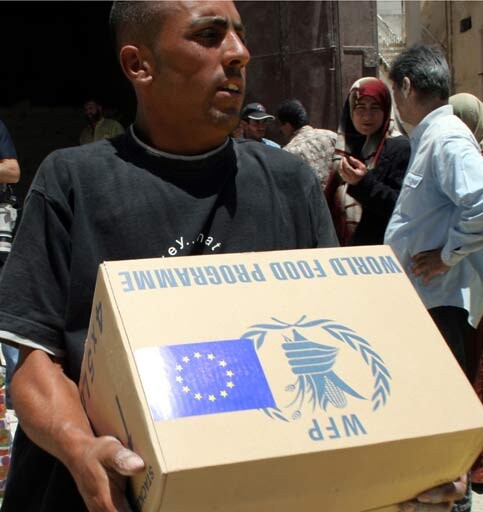United Nations News Service 6 December 2006

Palestinians receive supplies donated by the European Union and distributed by world food Programe (WFP) in the West Bank city of Hebron, July 9, 2006. (MaanImages/Mamoun Wazwaz)
The United Nations and its partners today launched their largest ever appeal for emergency aid to the occupied Palestinian territory - more than $453 million to help address a rapidly deteriorating situation after donors cut off funds to the Government when Hamas, which rejects Israel’s right to exist, won elections earlier this year.
“Two-thirds of Palestinians in the West Bank and the Gaza Strip are now living in poverty. Growing numbers of people are unable to cover their daily food needs and agencies report that basic services such as health care and education are deteriorating and set to worsen much further,” UN Humanitarian Coordinator Kevin Kennedy said, noting that children make up about half of the population of some 4 million.
The $453.6 million sought by 12 UN agencies together with 14 non-governmental organizations (NGOs) operating in the occupied Palestinian territory for 2007 is only exceeded by the $1.2 billion requested for Sudan and $687 million for the Democratic Republic of the Congo (DRC).
The rapid deterioration is linked with the fiscal crisis facing the Palestinian Authority that has been unable to pay its 160,000 staff, who support another 1 million family members. In addition, Palestinians are subject to increasing restrictions on their freedom of movement through Israeli security measures, limiting their access to jobs, markets, health services and schools.
Most of the funding will go towards addressing poverty through emergency employment programmes, and expanding food and agricultural aid. Agencies will also support the Palestinian institutions that deliver health, education and psycho-social services.
“Humanitarian assistance can cushion a deteriorating situation, but it ultimately cannot stop the decline,” David Shearer, head of the UN Office for the Coordination of Humanitarian Affairs (OCHA) said.
“Ultimately only a political settlement can generate a significant improvement. We are anxious to help the most needy maintain their dignity and have income. But the humanitarian community is not in a position to provide the full range services offered by the Palestinian Authority, and has no ambitions to do so,” he added.
Karen Koning AbuZayd, Commissioner-General of the UN Relief and Works Agency (UNRWA), which has been caring for Palestinian refugees since 1949, said the loss of life, livelihood and security in the territory is most distressing. “It is increasingly difficult for people to cope in such a volatile and unpredictable environment,” she added.
“We must go beyond this crisis to be able to help people regain the hope and optimism required for building a stable future. Providing the support outlined in this appeal will be a large step in the right direction.”
After Hamas won elections in January, Israel stopped handing over tax and customs revenues it collects on behalf of the Palestinian Authority, and international donors suspended direct aid, calling on Hamas to commit to non-violence, recognize Israel and accept previously signed agreements between Israel and the Palestinians.
Related Links